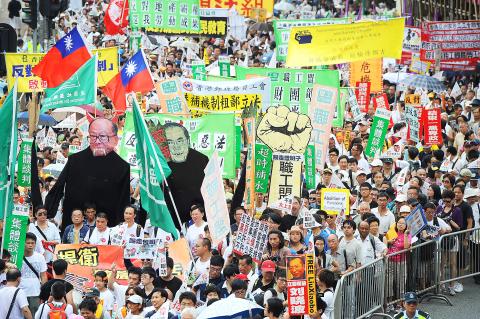Tens of thousands of people in Hong Kong vented their anger over skyrocketing property prices and government policies at an annual march held yesterday on the anniversary of the former British colony’s return to Chinese rule.
People blew whistles, beat drums and banged metal cups to express their unhappiness. Many waved flags calling for universal suffrage, while others chanted “Down down with property tycoons” and called for Hong Kong Chief Executive Donald Tsang (曾蔭權) to step down.
Since the territory was handed back to China on July 1, 1997, Hong Kong has largely retained its Western-style civil liberties, including press freedom and the right to hold public protests. However, its people still cannot directly elect the city’s chief executive or all legislative members.

Photo: AFP
One of the big themes of the march, held on a public holiday marking the 14th anniversary of the handover, is the growing rich-poor divide in Hong Kong, where skyrocketing property prices have left many residences unaffordable and forced out small shopkeepers. March organizers said they wanted to protest the “hegemony” of Hong Kong’s big property developers over the market.
Some protesters carried large signs depicting Tsang and billionaire Li Ka-shing (李嘉誠), Hong Kong’s richest man whose business empire includes a major property developer, with devil horns and vampire fangs. They chanted slogans accusing the government and developers of colluding to establish a monopoly.
Housing prices have been driven up by ultra-low interest rates and excess liquidity, and the government has tried to cool the market by introducing measures twice since November.
Residents are also upset over a recent government proposal to scrap by-elections and instead fill vacant legislative seats based on previous results.
The government came up with the idea after five pro-democracy legislators quit last year and ran again in a vote that they said would be seen as a de facto referendum on democratic reforms. The government argued that most people thought it was a waste of taxpayers’ money and that electoral laws needed to be changed to prevent similar campaigns in the future.
“The proposal to get rid of by-elections to fill vacancies in the Legislative Council is a crazy idea and insulting to the intelligence of the people of Hong Kong,” veteran democracy activist Martin Lee (李柱銘) said.
“That’s one principal reason, but also on social issues, there is a lot of unhappiness. That’s why the people are coming,” Lee said.

US President Donald Trump yesterday announced sweeping "reciprocal tariffs" on US trading partners, including a 32 percent tax on goods from Taiwan that is set to take effect on Wednesday. At a Rose Garden event, Trump declared a 10 percent baseline tax on imports from all countries, with the White House saying it would take effect on Saturday. Countries with larger trade surpluses with the US would face higher duties beginning on Wednesday, including Taiwan (32 percent), China (34 percent), Japan (24 percent), South Korea (25 percent), Vietnam (46 percent) and Thailand (36 percent). Canada and Mexico, the two largest US trading

AIR SUPPORT: The Ministry of National Defense thanked the US for the delivery, adding that it was an indicator of the White House’s commitment to the Taiwan Relations Act Deputy Minister of National Defense Po Horng-huei (柏鴻輝) and Representative to the US Alexander Yui on Friday attended a delivery ceremony for the first of Taiwan’s long-awaited 66 F-16C/D Block 70 jets at a Lockheed Martin Corp factory in Greenville, South Carolina. “We are so proud to be the global home of the F-16 and to support Taiwan’s air defense capabilities,” US Representative William Timmons wrote on X, alongside a photograph of Taiwanese and US officials at the event. The F-16C/D Block 70 jets Taiwan ordered have the same capabilities as aircraft that had been upgraded to F-16Vs. The batch of Lockheed Martin

GRIDLOCK: The National Fire Agency’s Special Search and Rescue team is on standby to travel to the countries to help out with the rescue effort A powerful earthquake rocked Myanmar and neighboring Thailand yesterday, killing at least three people in Bangkok and burying dozens when a high-rise building under construction collapsed. Footage shared on social media from Myanmar’s second-largest city showed widespread destruction, raising fears that many were trapped under the rubble or killed. The magnitude 7.7 earthquake, with an epicenter near Mandalay in Myanmar, struck at midday and was followed by a strong magnitude 6.4 aftershock. The extent of death, injury and destruction — especially in Myanmar, which is embroiled in a civil war and where information is tightly controlled at the best of times —

China's military today said it began joint army, navy and rocket force exercises around Taiwan to "serve as a stern warning and powerful deterrent against Taiwanese independence," calling President William Lai (賴清德) a "parasite." The exercises come after Lai called Beijing a "foreign hostile force" last month. More than 10 Chinese military ships approached close to Taiwan's 24 nautical mile (44.4km) contiguous zone this morning and Taiwan sent its own warships to respond, two senior Taiwanese officials said. Taiwan has not yet detected any live fire by the Chinese military so far, one of the officials said. The drills took place after US Secretary